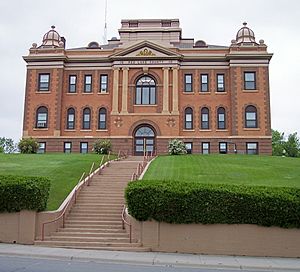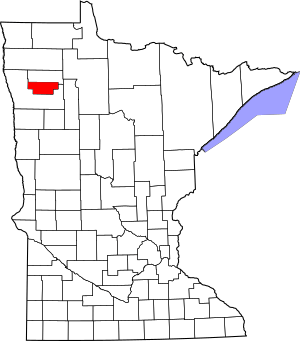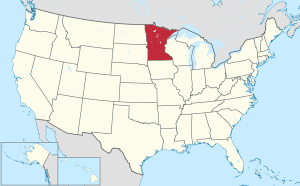Red Lake County, Minnesota facts for kids
Quick facts for kids
Red Lake County
|
|
|---|---|

The Red Lake County Courthouse in Red Lake Falls in 2007
|
|

Location within the U.S. state of Minnesota
|
|
 Minnesota's location within the U.S. |
|
| Country | |
| State | |
| Founded | December 24, 1896 |
| Named for | Red Lake River |
| Seat | Red Lake Falls |
| Largest city | Red Lake Falls |
| Area | |
| • Total | 432 sq mi (1,120 km2) |
| • Land | 432 sq mi (1,120 km2) |
| • Water | 0.09 sq mi (0.2 km2) 0.02% |
| Population
(2020)
|
|
| • Total | 3,935 |
| • Estimate
(2023)
|
3,911 |
| • Density | 9.1/sq mi (3.5/km2) |
| Time zone | UTC−6 (Central) |
| • Summer (DST) | UTC−5 (CDT) |
| Congressional district | 7th |
Red Lake County is a small area in the northwestern part of Minnesota. It is called a county. In 2020, about 3,935 people lived there. This makes it one of the least populated counties in Minnesota. The main town, or county seat, is Red Lake Falls.
Contents
History of Red Lake County
Red Lake County was officially created on December 24, 1896. It was formed from parts of Polk County. The county got its name from the Red Lake River.
Red Lake Falls was chosen as the county seat. It became a village in 1881. The county has two important historical places. These are the courthouse and the Clearwater Evangelical Lutheran Church. Both are listed on the National Register of Historic Places.
Geography and Rivers
The Red Lake River flows into Red Lake County from the north. Near Red Lake Falls, another river joins it. This is the Clearwater River. The combined rivers continue as the Red Lake River.
Further southwest, the Black River also joins. This river drains the northwestern part of the county. The land in the county has gentle hills. It also has many small valleys and ditches. Most of the land is used for farming.
The county's land slopes towards the west. Its highest point is in the southeastern corner. This spot is about 1,201 feet (366 meters) above sea level (ASL). The county covers about 432 square miles. Almost all of this area is land. Only a tiny part is water.
Even though it's called Red Lake County, it has only one named lake. This lake is called Moran Lake. It is located near the community of Huot. Red Lake County is unique because it borders only two other counties. It is also not on an international border.
Main Roads in Red Lake County
 U.S. Highway 2
U.S. Highway 2 U.S. Highway 59
U.S. Highway 59 Minnesota State Highway 32
Minnesota State Highway 32 Minnesota State Highway 92
Minnesota State Highway 92 Minnesota State Highway 222
Minnesota State Highway 222
Neighboring Counties
- Pennington County – to the north
- Polk County – to the south
Protected Natural Areas
- Moran State Wildlife Management Area
- Old Crossing & Treaty County Wayside Park
People of Red Lake County
| Historical population | |||
|---|---|---|---|
| Census | Pop. | %± | |
| 1900 | 12,195 | — | |
| 1910 | 6,564 | −46.2% | |
| 1920 | 7,263 | 10.6% | |
| 1930 | 6,887 | −5.2% | |
| 1940 | 7,413 | 7.6% | |
| 1950 | 6,806 | −8.2% | |
| 1960 | 5,830 | −14.3% | |
| 1970 | 5,388 | −7.6% | |
| 1980 | 5,471 | 1.5% | |
| 1990 | 4,525 | −17.3% | |
| 2000 | 4,299 | −5.0% | |
| 2010 | 4,089 | −4.9% | |
| 2020 | 3,935 | −3.8% | |
| 2023 (est.) | 3,911 | −4.4% | |
| U.S. Decennial Census 1790–1960 1900–1990 1990–2000 2010–2020 |
|||
In 2020, the population of Red Lake County was 3,935 people. Most residents, about 92%, identified as White. Other groups included Native American, Black or African American, Asian, and Pacific Islander people. About 2.6% of the population identified as Hispanic or Latino.
Communities in Red Lake County
Cities
- Brooks
- Oklee
- Plummer
- Red Lake Falls (the county seat)
Unincorporated Communities
These are smaller places that are not officially cities.
- Dorothy
- Garnes
- Huot
- Perault
- Terrebonne
- Wylie
Townships
Townships are local government areas within the county.
- Browns Creek Township
- Emardville Township
- Equality Township
- Garnes Township
- Gervais Township
- Lake Pleasant Township
- Lambert Township
- Louisville Township
- Poplar River Township
- Red Lake Falls Township
- River Township
- Terrebonne Township
- Wylie Township
Red Lake County in the News
Red Lake County once received attention from a reporter named Christopher Ingraham. He wrote a story for the Washington Post. In his story, he called Red Lake County "the absolute worst place to live in America." He based this on a ranking of counties by their scenery and climate.
People from the county and Minnesota were not happy about this. So, Mr. Ingraham decided to visit Red Lake County himself. After his visit, he completely changed his mind! He even moved there with his family. Later, he wrote a book about his experience living in Red Lake County.
See also
 In Spanish: Condado de Red Lake para niños
In Spanish: Condado de Red Lake para niños
 | Janet Taylor Pickett |
 | Synthia Saint James |
 | Howardena Pindell |
 | Faith Ringgold |

